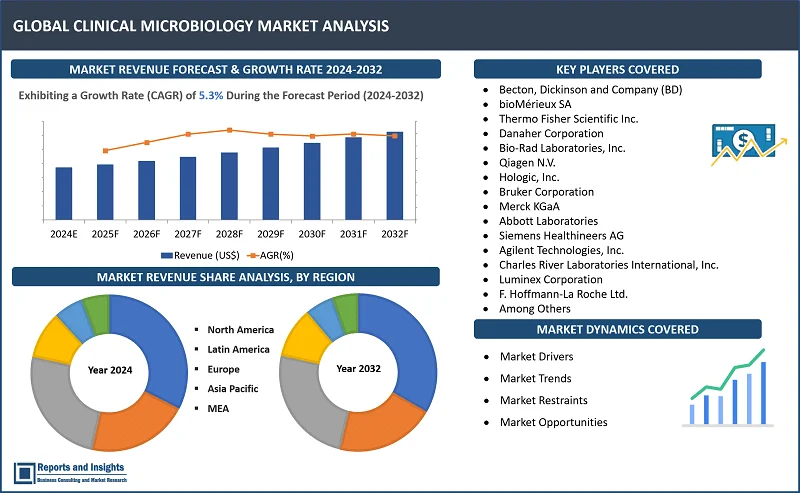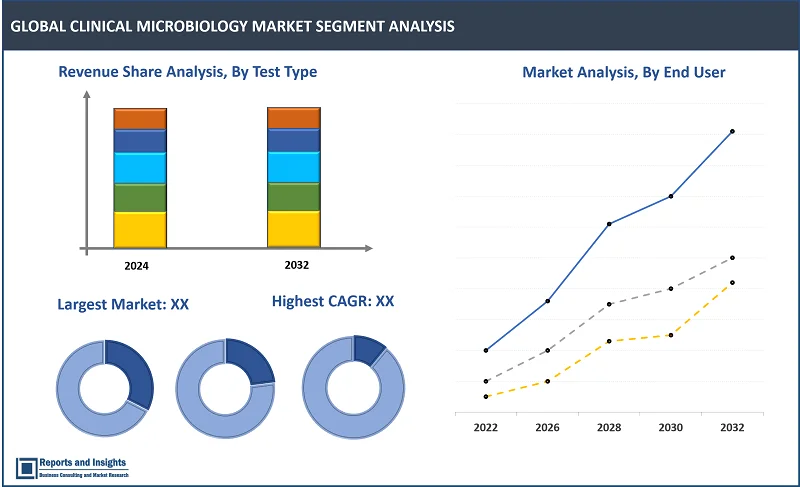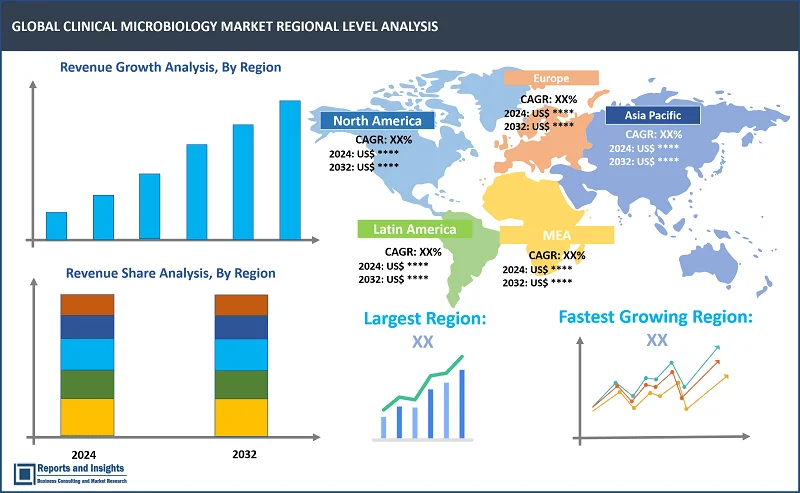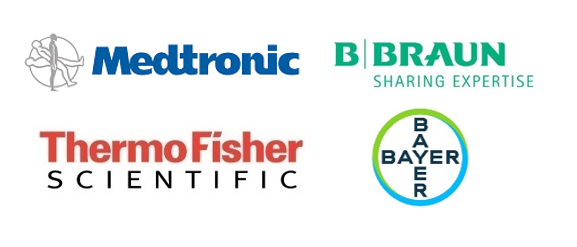Market Overview:
"The global clinical microbiology market was valued at US$ 4.3 Billion in 2023 and is expected to register a CAGR of 5.3% over the forecast period and reach US$ 6.8 Billion in 2032."
|
Report Attributes |
Details |
|
Base Year |
2023 |
|
Forecast Years |
2024-2032 |
|
Historical Years |
2021-2023 |
|
Clinical Microbiology Market Growth Rate (2024-2032) |
5.3% |
Clinical microbiology refers to a broad range of testing methodologies, and comprises various methods of testing for characterization of infectious organisms such as bacteria, fungi, viruses, and parasites. These testing approaches are majorly reliant on culture-based methods and phenotypic methods for identification of culture organisms and enables presenting of the infections and syndromes caused by microorganisms, and the management of infective diseases and aetiological agents. Clinical microbiology addresses the latex agglutination, immunofluorescent, monoclonal antibody, and nucleic acid also probe investigations. Diagnostic microbiology is also crucial for identifying specific pathogenic microbes that cause disease, as well as to distinguish these from normal flora and from environmental organisms that are not disease-causing. Key components of clinical microbiology include specimen collection & handling, microbial identification, antimicrobial susceptibility testing, serology and immunology, molecular diagnostics, mycology, virology, and parasitology, infection control & epidemiology, quality control & quality assurance.
The importance of clinical microbiology laboratories has been increasing, at various levels, and play a crucial responsibility to provide rapid and accurate diagnostic services for emerging or new, and reemerging infectious diseases. These settings are especially important in the testing and identification of those diseases, for which significant mortality or morbidity may occur as the result of a delay in diagnosis. Also, rising prevalence of infectious diseases and current-day threats associated with bioterrorism and new and emerging pathogens and risks of infection and spread are driving need for rapid diagnosis, increased standardization of testing techniques and approaches, and greater adaptability to identify and deal with new threats from infectious microorganisms.
In addition, ongoing studies on microbes in the medical sector to better understand microorganisms and how these cause disease and also to enable rapid diagnosis and cure are supporting growth of the clinical microbiology market. Moreover, such studies are resulting in positive outcomes, with researchers discovering benefits of microorganisms in human health as nutrition or medicine, and in the curation of innovative agricultural products. Furthermore, technological advancements in the study of microorganisms, infectious diseases, microbial ecology, plant and animal pathology, and biotechnology are proving to hold major advantages for improving human life and wellbeing, and extending favorable impact on the environment.

Clinical Microbiology Market Trends and Drivers:
In recent years, medical personnel and researchers, pharmaceutical companies and investors, and governments have been implementing programs and initiatives to address emergence and rising prevalence of infectious diseases, especially since the COVID-19 pandemic and subsequent mass infections and deaths worldwide. Reinforced with real-time data and insights left in the wake of the pandemic, and by the gravity such a realistic threat or event can present in future, research groups, health professionals, technology companies, and government bodies have been undertaking and encouraging, as well as investing in initiatives to be able to combat any such events when required.
Also, keen focus into initiatives to develop more robust approaches in the medical field, including clinical microbiology, to address risks and challenges pathogens continue to present have been ongoing. Emergence of new and also remerging pathogens and resulting disease and infections are driving urgent need for enhanced microbiology testing in clinical settings. Related or associated challenges in healthcare include increasing number of individuals being diagnosed with infections caused by emerging and reemerging pathogens and rising need to advance testing capabilities to diagnose and treat such infections to halt further spread.
Another focus point in the field is the need to improve accuracy and speed of diagnostics as well as services offered in clinical microbiology. Technology continues to serve in crucial current-day needs to enable faster identification and diagnosis of pathogens and infections, as well as enabling faster treatment. Some key innovations in clinical microbiology and emergence of platforms such as Next Generation Sequencing (NGS), automated identification systems, and Polymerase Reaction (PCR) are definitely aiding in addressing existing, new, and emerging challenges. Adoption of new technologies and approaches to address urgent challenges such as need for enhanced speed, accuracy, and sensitivity of various diagnostic procedures, is expected to drive further advancements and development of more innovative and efficient testing and diagnostic breakthroughs in the near future.
Clinical microbiology also plays a major role beyond healthcare, and is crucial in sectors such as the food and beverage industry, where stringent food safety standards and regulations mandate rigorous microbial testing to ensure products are free from contaminants and potential pathogens. Various tests and quality control and assurance procedures are required before products are deemed fit for human consumption, and rising demand for food, development and formulation of new products and manufacturing and processing procedures and techniques, as well as use of various innovative ingredient in food and beverages are driving rise in testing procedures, and this is expected to continue to support market growth.
Clinical microbiology is a mainstay in the pharmaceutical industry and microbiological testing is crucial in drug development and manufacturing processes. Microbiological testing is also crucial in industrial and commercial sectors to ensure quality control ad well as to comply with specific regulations and standards. Large-scale testing and need for approaches to address various challenges and introduce ease and convenience in procedures has resulted in a number of new product developments and novel diagnostic products and solutions more recently. Companies are entering into collaborations and strategic agreements and also adopting merger and acquisition strategies to explore and develop more comprehensive diagnostic products and services. Integration of Artificial Intelligence (AI) and Machine Learning (ML) in clinical microbiology tools and procedures is serving to improve data analysis and predictive capabilities, streamline diagnostic workflows, and also enhance clinical outcomes. In addition, technology integration has been aiding in major advancements in the shift towards personalized medicine and treatment, and AI and ML are assisting in precise pathogen identification and susceptibility testing, apart from speeding up overall approaches and outcomes, enabling targeted and effective treatments, and bringing the world closer to combatting the spread of antibiotic resistant infectious microorganisms and infections and diseases.
Clinical Microbiology Market Restraining Factors:
Clinical microbiology equipment requires the most stringent and safe environments or need to be 'tropicalized' so as to be able to withstand harsh climatic conditions, humidity, and not be exposed to particles/sand etc. High humidity and extreme temperatures can impact accuracy and functionality of sample results and equipment. Environmental sensitivity is a major concern for equipment such as incubators, centrifuges, and PCR machines, and need for maintaining specific or precise environmental conditions to ensure accurate results can be challenging in certain circumstances and regions.
Condensation within or inside equipment can cause electrical failure and corrosion, and temperature fluctuations can cause changes in humidity levels. Also, durability and robustness are essential in tropical and arid regions, and equipment requires to be ‘tropicalized’ or designed to withstand harsh conditions. Cost of equipment increases significantly as a result of need for reinforced castings, sealed electronics, and protective coatings to prevent damage or impact from dust, sand, or moisture, as well as to ensure less-frequent breakdowns or need for constant maintenance.
In addition, managing sterile conditions is crucial, and equipment exposed to dust or sand can become contaminated, resulting in potential compromised samples and inaccurate results. Ensuring appropriate and safe environments and preventing particulate contamination necessitates use of effective filtration systems and sealing measures and solutions. These can add up to overall costs and restrict adoption or purchase of such systems and equipment, and result in higher preference for use of centers and laboratory services and third-party services and platforms.
Moreover, high costs associated with diagnostic tools and equipment are a significant restraint, especially for more advanced systems and solutions. This is particularly for smaller healthcare facilities and institutions in developing economies. Stringent safety regulations and compliance requirements can also add to the complexity, as adhering can require substantial investment in infrastructure deployment and modification, as well as for training of personnel. Research & Development (R&D) challenges also figure high on the list of factors that can have an impact on market growth. Developing new diagnostic methods and technologies is considerably time-consuming, and can entail significant investment and risk, with uncertain returns. Furthermore, demand for advanced clinical microbiology testing can be impacted by availability of alternative testing approaches and emerging technologies such as rapid antigen tests and biosensors, which are competitive alternatives to conventional microbiological diagnostics.
Clinical Microbiology Market Opportunities:
Leading companies offering advanced microbiology solutions can leverage opportunities by expanding into emerging markets such as Asia Pacific and Latin America, and leverage avenues arising from rising investments on healthcare infrastructure and increasing incidence of infectious diseases. Establishing partnerships with local players and distributors can expand networks and ease market penetration. Investing in development of innovative diagnostic technologies such as NGS and CRISPR-based assays to provide faster and more accurate pathogen identification can open up additional revenue streams. Developing solutions such as point-of-care testing devices that are tailored to remote and resource-strained settings can also serve to address unmet needs and cater to a broader market segment.
Strategic moves, including mergers, acquisitions, and collaborations can enable companies to acquire complementary technologies and expertise, which can also enhance product portfolio and further accelerate development of new solutions. Collaborations with academic institutions and research organizations can support initiatives focused on innovation and expedite product development.
Clinical Microbiology Market Segmentation:

By Product Type
- Instruments
- Reagents
- Consumables
- Software & Services
Among the product type segments in the clinical microbiology market, the reagents segment is expected to account for the largest revenue share. This projection is supported by the high and recurring demand for reagents in various diagnostic tests, the crucial role reagents play in accurate and reliable test results, and the continuous advancements in reagent formulations to improve sensitivity and specificity. Also, expanding use of molecular diagnostics and increasing prevalence of infectious diseases are further expected to drive adoption of testing and support revenue growth of the reagents segment.
By Application
- Disease Diagnosis
- Food & Beverage Testing
- Pharmaceutical Applications
- Environmental Testing
Among the application segments, the disease diagnosis segment is expected to account for the largest revenue share. This projection is supported by growing burden of infectious diseases worldwide, driving the need for accurate and timely diagnosis. In addition, advancements in diagnostic technologies, such as molecular testing and automation, enhance the efficiency and accuracy of disease diagnosis. Furthermore, increasing adoption of point-of-care testing and expansion of healthcare infrastructure in emerging markets is expected to continue to contribute to revenue growth of this segment.
By End User
- Hospitals & Diagnostic Laboratories
- Academic & Research Institutes
- Pharmaceutical & Biotechnology Companies
- Others
Among the end-user segments in the clinical microbiology market, the hospitals and diagnostic laboratories segment is expected to account for the largest revenue share. This projection is supported by the high volume of diagnostic tests performed in these settings, driven by increasing incidence of infectious diseases and the need for accurate and timely diagnosis. Also, hospitals and diagnostic laboratories ideally have well-established infrastructure and resources to support sophisticated microbiology testing.
By Test Type
- Bacterial Testing
- Viral Testing
- Fungal Testing
- Parasitological Testing
Among the test type segments, the bacterial testing segment is expected to account for the largest revenue share. This can be attributed to high prevalence of bacterial infections globally, driving the demand for accurate and rapid diagnostic tests. Bacterial testing is essential for various clinical applications, including diagnosing respiratory, urinary tract, and bloodstream infections. In addition, increasing incidence of antibiotic-resistant bacteria underscores the importance of effective bacterial testing, and this is expected to support revenue growth of this segment.
By Region

North America
- United States
- Canada
Europe
- Germany
- United Kingdom
- France
- Italy
- Spain
- Russia
- Poland
- Benelux
- Nordic
- Rest of Europe
Asia Pacific
- China
- Japan
- India
- South Korea
- ASEAN
- Australia & New Zealand
- Rest of Asia Pacific
Latin America
- Brazil
- Mexico
- Argentina
Middle East & Africa
- Saudi Arabia
- South Africa
- United Arab Emirates
- Israel
- Rest of MEA
The global clinical microbiology market is divided into five key regions: North America, Europe, Asia Pacific, Latin America, and the Middle East and Africa. The global clinical microbiology market exhibits varying scenarios across regional markets. North America leads among the regional markets, with the United States (US) and Canada being the major revenue share contributors, driven by factors such as high healthcare expenditure, technological advancements, and the presence of key market players in the region.
In Europe, countries such as Germany, France, and the United Kingdom (UK) contribute significantly in terms of revenue share, supported by robust healthcare infrastructure and increasing investments in research and development. Asia Pacific market continues to register a rapid revenue growth rate, with China, India, and Japan accounting for sizable revenue contribution to the market in the region. This rapid market growth can be attributed to factors such as rising prevalence of infectious diseases, improving healthcare infrastructure, and increasing awareness about the importance of early disease diagnosis and treatment.
Leading Companies in Clinical Microbiology Market & Competitive Landscape:
The landscape in the global clinical microbiology market is highly competitive with leading companies striving to maintain their positions and expand their consumer bases. Key players such as Becton, Dickinson and Company (BD), bioMérieux SA, and Thermo Fisher Scientific Inc. are adopting various strategies to achieve these objectives.
One key strategy is continuous innovation in product development, with a focus on introducing advanced diagnostic technologies and solutions that offer greater accuracy, efficiency, and ease of use. In addition, strategic collaborations and partnerships with healthcare institutions, research organizations, and other industry players enable companies to broaden their market reach and access new customer segments. In addition, mergers and acquisitions are being employed to strengthen market presence, enhance product portfolios, and capitalize on synergies to drive growth. Overall, these strategies help leading companies in the clinical microbiology market to stay competitive and meet the evolving needs of healthcare providers and consumers worldwide.
These companies include:
- Becton, Dickinson and Company (BD)
- bioMérieux SA
- Thermo Fisher Scientific Inc.
- Danaher Corporation
- Bio-Rad Laboratories, Inc.
- Qiagen N.V.
- Hologic, Inc.
- Bruker Corporation
- Merck KGaA
- Abbott Laboratories
- Siemens Healthineers AG
- Agilent Technologies, Inc.
- Charles River Laboratories International, Inc.
- Luminex Corporation
- F. Hoffmann-La Roche Ltd.
Recent Development:
- April 2024: Bruker announced at the ESCMID Global 2024 conference, it is advancing its cutting-edge diagnostic solutions for microbial identification, Antimicrobial Susceptibility Testing (AST), early sepsis diagnostics, and other infectious disease assays. Among the recent developments is the introduction of the MBT Pathfinder IVD robot, designed for automated MALDI Biotyper target preparation. Additionally, Bruker has unveiled the LiquidArray MTB-XDR panel, facilitating simultaneous detection of M. tuberculosis complex bacteria and their resistances to five WHO-recommended second-line drugs against multidrug-resistant tuberculosis. Also, the pending acquisition of ELITech, which has received all regulatory clearances, is nearing completion, with the closing anticipated in the second quarter of 2024.
- May 2023: BD (Becton, Dickinson and Company), which is a prominent global medical technology firm, announced receiving FDA clearance of its new BD Kiestra Methicillin-resistant Staphylococcus aureus (MRSA) imaging application. This innovative tool utilizes Artificial Intelligence (AI) to interpret bacterial growth, thereby streamlining the assessment of Petri dishes with minimal human intervention. BD Kiestra MRSA imaging application helps enhance microbiology laboratory efficiency and workflow by automating this traditionally laborious process. The application enables medical laboratory personnel to allocate more time to high-value analyses and the AI-powered system can assess individual specimens or group multiple plates with negligible growth for collective review and release of negative results, potentially easing the workload for technicians. Utilizing AI algorithms to identify specific culture characteristics on the BBL CHROMagar MRSA II plate, the application organizes plate images for efficient analysis by laboratory staff, thereby enhancing workflow efficiency.
Clinical Microbiology Market Research Scope
|
Report Metric |
Report Details |
|
Clinical Microbiology Market size available for the years |
2021-2023 |
|
Base Year |
2023 |
|
Forecast Period |
2024-2032 |
|
Compound Annual Growth Rate (CAGR) |
5.3% |
|
Segment covered |
Product Type, Application, End User, Test Type, and Region |
|
Regions Covered |
North America: The U.S. & Canada Latin America: Brazil, Mexico, Argentina, & Rest of Latin America Asia Pacific: China, India, Japan, Australia & New Zealand, ASEAN, & Rest of Asia Pacific Europe: Germany, The U.K., France, Spain, Italy, Russia, Poland, BENELUX, NORDIC, & Rest of Europe The Middle East & Africa: Saudi Arabia, United Arab Emirates, South Africa, Egypt, Israel, and Rest of MEA |
|
Fastest Growing Country in Europe |
UK |
|
Largest Market |
North America |
|
Key Players |
Becton, Dickinson and Company (BD), bioMérieux SA, Thermo Fisher Scientific Inc., Danaher Corporation, Bio-Rad Laboratories, Inc., Qiagen N.V., Hologic, Inc., Bruker Corporation, Merck KGaA, Abbott Laboratories, Siemens Healthineers AG, Agilent Technologies, Inc., Charles River Laboratories International, Inc., Luminex Corporation, F. Hoffmann-La Roche Ltd. |

